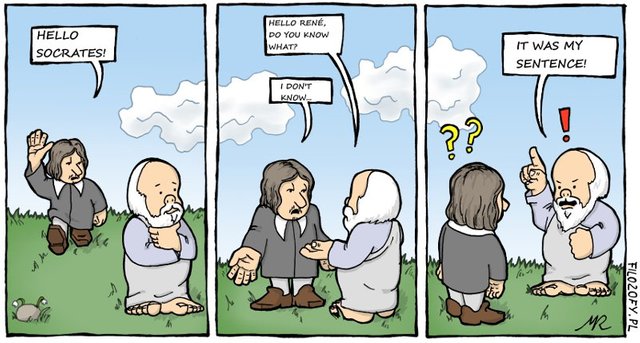Philosophy 101, #10: What is an Epistemologically Modest Person?
The epistemologically modest person is someone who is aware that he knows just how little he knows. It was well expressed by Socrates when he said:
“All I know is that I know nothing”.

I believe that this attitude is extremely important to hold as an inquisitive human being.
Karl Popper
An epistemologically modest person starts with his own awareness of his ignorance from where he grows his wisdom. Karl Popper has applied the position of the epistemologically modes person to the area of politics, and maintains that this type of person would less likely act as a ‘social engineer’ and would therefore less likely cause unintended consequences. The social engineer should be careful that his next policies to end the unintended consequences, which were created by his previous policies in the first place, would create more unintended consequences. It could be the beginning of an ugly downward spiraling out-of-control policy-making disaster.
Karl Popper takes this position extremely serious, and believes that much of our intellectual world is being ruled by intellectual immodesty - by intellectuals who use grandiose words that sound very intelligent and whose theories are extremely opaque, but downright wrong. He writes:
I have decided to preach intellectual modesty for the rest of my days. There is a tradition, an enormously strong tradition of intellectual immodesty and irresponsibility. Around the year 1930 I told a joke. I said that many students don't go to university assuming that it is a great empire of knowledge, in the hope to gain some understanding; but that they go to university to learn how to speak in an impressive and incomprehensible way. This is the tradition of intellectualism. At the time I thought it was a joke. But having become a university professor myself, I have perceived with horror that it is a reality. That's the way things are, unfortunately. In universities there is a tradition that legitimizes this attitude, it is the tradition of hegelianism. Especially in Germany, Hegel is extraordinarily admired. People really believe that Hegel was a great philosopher because he used big words. And it is exactly this incredible immodesty that destroys so much in and between intellectuals. I would like to spend my last years fighting against this. I want to start a new fashion. I have always fought against fashions, and I have never followed any fashion, and I have never tried to start one. But I would love to start a new fashion of intellectual modesty, of permanent thought of everything we don't know.
Reference
Karl Popper & Konrad Lorenz (1999). Die Zukunft ist Offen.
I agree that epistemological modesty is very important, but my own view is different from that of Socrates. I claim to know many things (and I think that the average person knows many things), but I do not claim to know much (if anything) with certainty. Knowledge, being nothing more than true belief supported by strong argument or evidence, is actually not that hard to come by I believe. Certain knowledge, on the other hand, is extremely rare (if it exists at all).
The key, I believe, is not to deny knowledge, but rather to realise that you might be mistaken. According to the view called fallibilism, you should hold your beliefs only provisionally and always be prepared to re-evaluate any position that you hold and to revise it whenever the new information warrants it. I wrote about this in my first post on Steemit: https://steemit.com/introduceyourself/@morality2/morality-version-2-0-joining-the-new-marketplace-of-ideas
Hi, thank you for your comment. I have read your first post with great interest, and I agree with you on fallibilism.
But I don't think we should take Socrates' saying that he knows nothing seriously. This in itself is a paradox, as saying that he knows nothing is still confirming his knowledge that he knows he knows nothing.
Btw, I like all your other posts as well. They're very thoughtful. You have a new follower. :)
If one would create a formula of personality traits and so to give result in a great human being. Intellectual modesty is definitely one of the key variable. :)
Yes, it's a necessary attribute of great men.
Intellectual modesty, intellectual humility
Yes...
Very interesting! Thanks
I'm glad you find it interesting. :)
nice- 27.581
What does 27.581 mean? Anyway, I'm glad that you like it! :)
I really don't know how to comment this one.
Hm.. is that a good or bad thing? I edited it a little bit again so that maybe, you now know how to comment on it. ;)
Thank you for your comment, nonetheless. :)
That was just my little joke with regard to Socrates quote “All I know is that I know nothing”. :)
Oooo... I get it now. :D
It s always good to read that and remind that we are all educated persons in progress with no hope to know everything. Share our knowledge and learn from others are the keys of success et happiness. Thanks for this text @chhayling
You're welcome! I'm glad you have enjoyed reading the article. :)